Special Coverage of the NexTech 2016 Conference
NexTech 2016 Conference has brought together hundreds of senior executives from the industrial and high-tech worlds and representatives from 15 countries
IsraelDefense
| 01/12/2016
Hundreds of people have participated at the NexTech Be'er-Sheva 2016 – the International Advanced Technology Conference, which was held yesterday (November 30, 2016) at the Gav-Yam Negev Hi-Tech Park in Be'er-Sheva, Israel. NexTech is the first conference of its kind in Israel for individuals and organizations involved in the most advanced technological developments from academia and a variety of innovative industries.
The conference was initiated by the Gav-Yam Negev High-Tech Park, Ben-Gurion University, the city of Be'er-Sheva, Israel Defense, and CyberTech – the international event of the cyber technology industry.
During the conference, the Ben-Gurion University and PayPal announced a new partnership. The Ben-Gurion University and PayPal will engage in joint studies and development projects in the fields of Big Data, machine learning, and cybersecurity. This is the first alliance where the PayPal Company associates with an academic institution in Israel. For further information, click here.
Also, the Ben-Gurion University and ImageSat announced the development of an HD spectral sensing system for space missions. Details regarding the cooperative alliance were reported by the head of the research team on behalf of the Ben-Gurion University, Professor Adrian Stern, and the Vice President & R&D Dean of Ben-Gurion University of the Negev, Professor Dan Blomberg. For more details, click here.

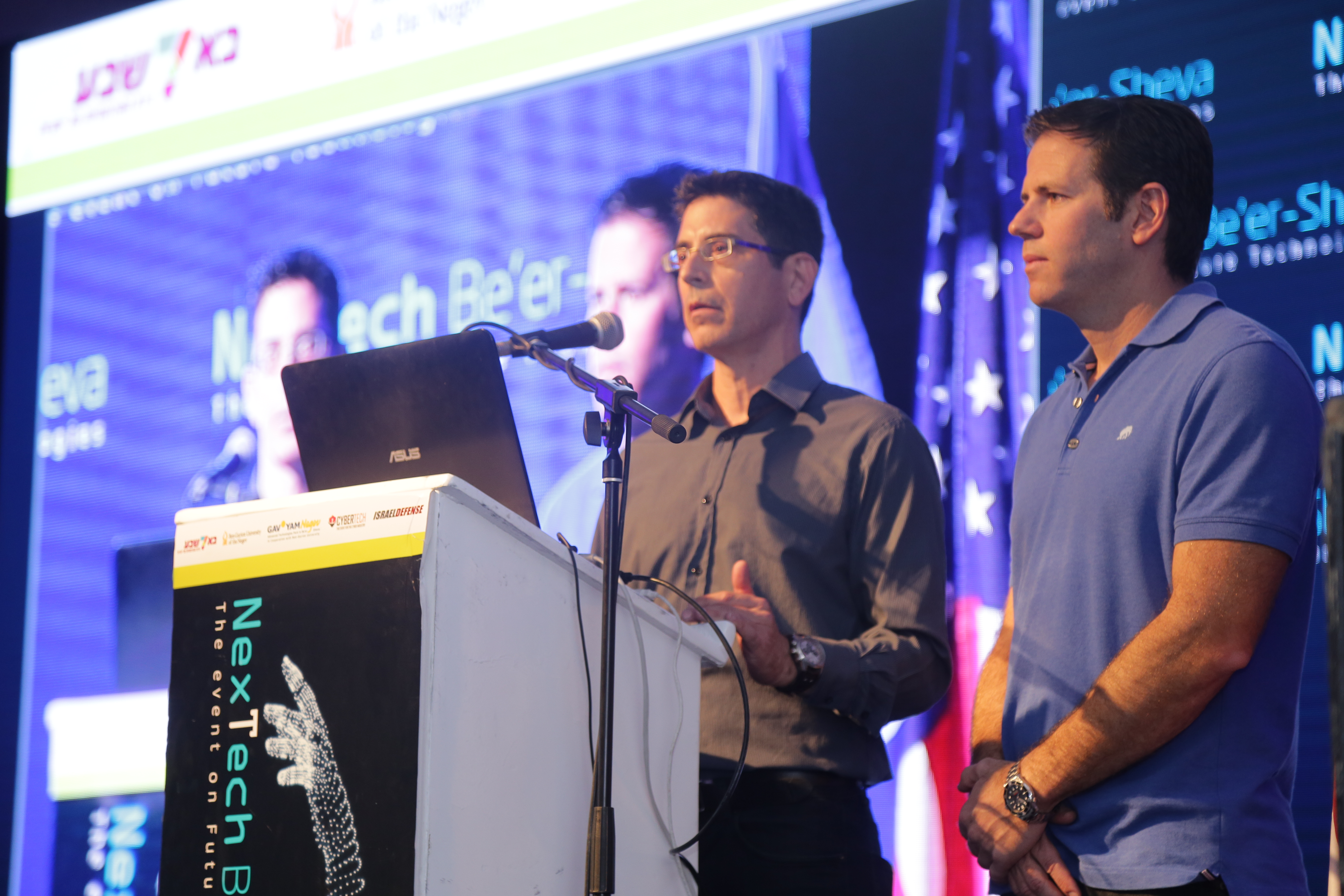
The conference themes included future technologies in the fields of Robotics, Cyber Security, AI, Digital Health, IoT, Connected Cars, Machine Learning and others. It also included a unique panel discussion on the subject of the relocation of the elite IDF technology units adjacent to the Hi-Tech Park, as part of the IDF relocation to the Negev region.
"A Global Cyber Superpower is developing in Be'er-Sheva"
The vision of creating an ecosystem combining science and academia, industries, high-tech, the military, C4I, cyberspace and state-of-the-art technology is materializing in Be'er-Sheva – that was the message of the opening of the NexTech 2016 Conference.
The IDF Chief Communications Officer, Brig. Gen. Nati Cohen, reviewed the connection between the relocation of IDF to the Negev and the most profound change the IDF is currently undergoing – the implementation of a new operational concept of making the information available to IDF accessible all the way down to the battalion commanders and other junior commanders in the field. The IDF is gradually evolving into 'Network IDF,' a military organization that would implement network-centric warfare, namely – operational Internet and the establishment of a central database out of which the information will be delivered to the end user – the commander on the ground. That is the concept which best suits the changes in the modes of war on today's battlefield. That is the outcome of the transition from Big Data centers to making the information accessible all the way down to the tactical echelon.

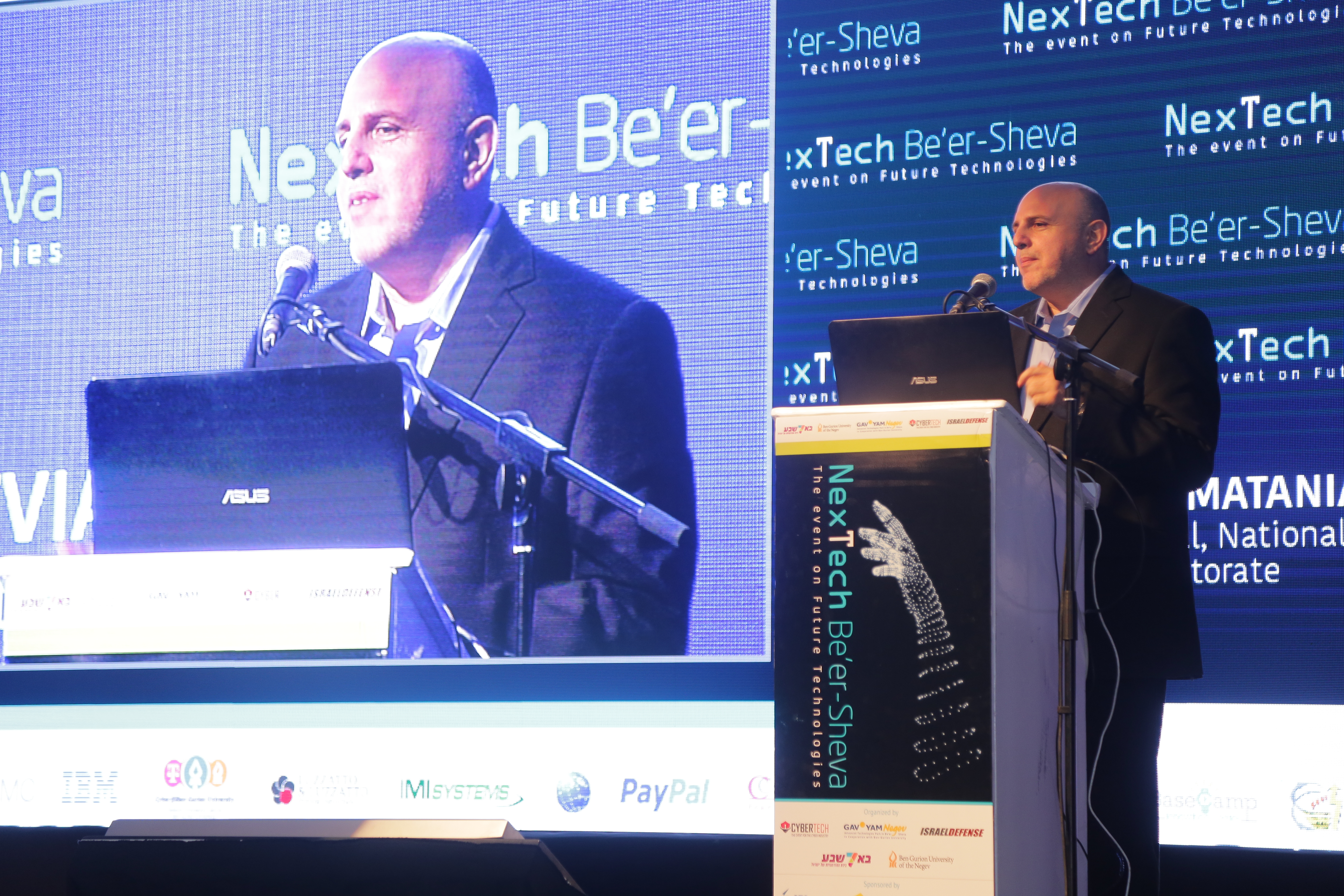
Dr. Eviatar Matania, Head of the Israeli National Cyber Bureau, announced that cyber technology is evolving into the core of future technologies. Dr. Matania elaborated on the role and function of the state: "The government must be involved by placing at the disposal of science the resources, the infrastructures, but the government must not dictate curricular contents or business plans. The government should not dictate to academia or to industry – its role is to assist but not to interfere."
According to the Head of the National Cyber Bureau, a global cyber superpower is currently developing in Be'er-Sheva. In order to ensure that it continues to prosper and exist, the best scientific manpower must be trained and prepared. Today, cyber affects the economy, academia, society and the military, said Dr. Matania.
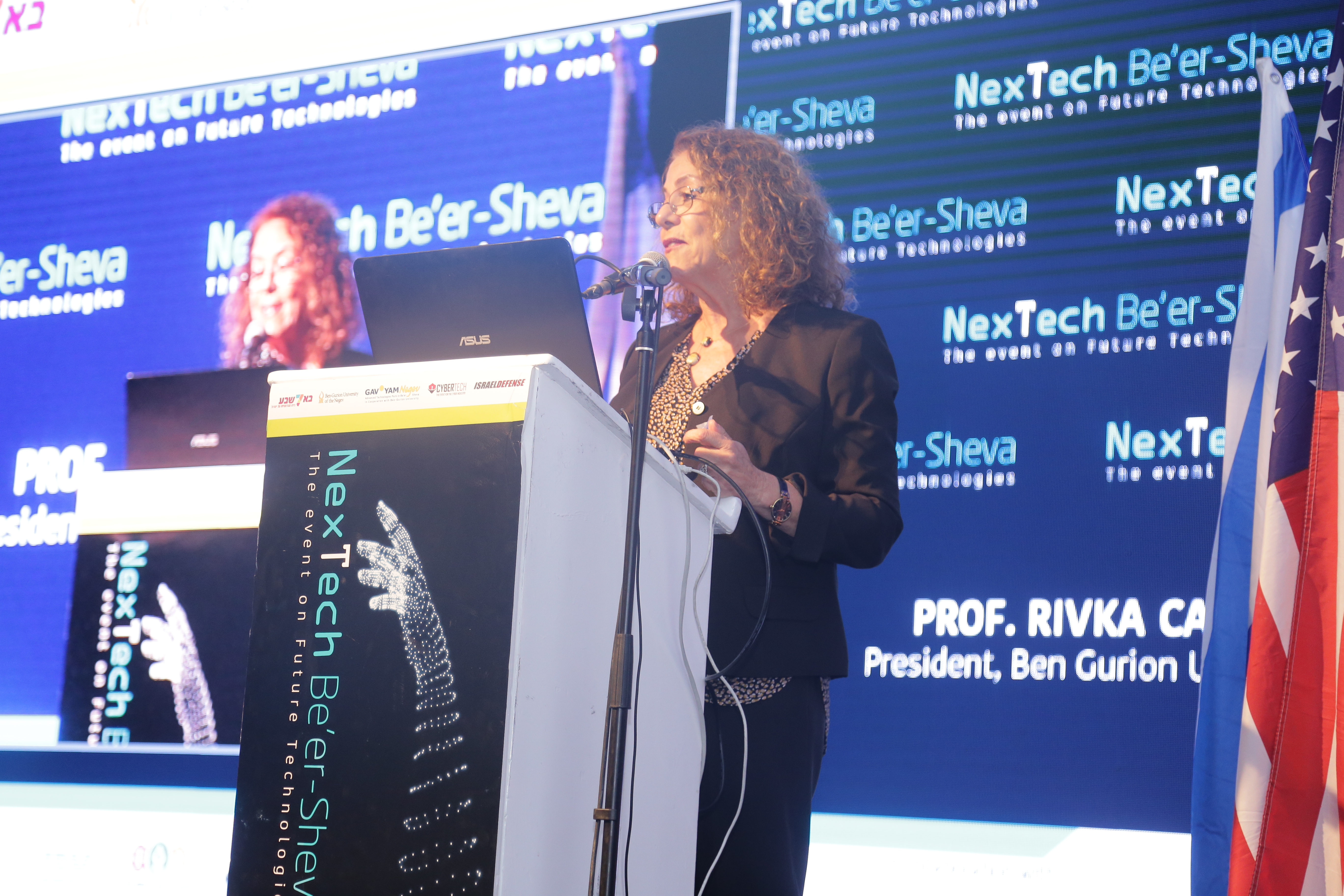
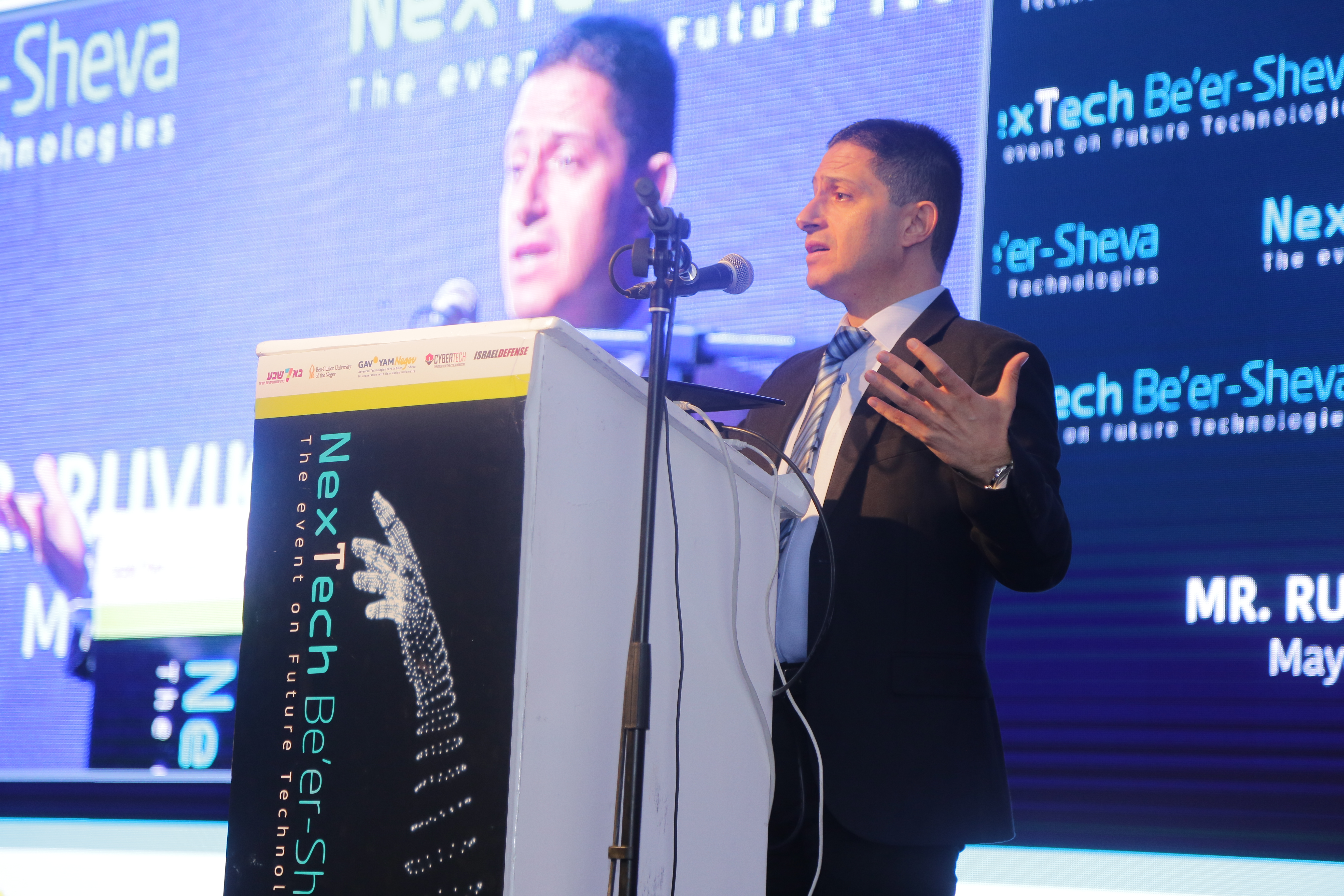
Professor Rivka Carmi, President of the Ben-Gurion University, said that the Gav-Yam High-Tech Park is already home to 50 international corporations. "The concept of cooperation between academia and the industries has proven its effectiveness and it works. A production line of talent, vision, strong will, entrepreneurship and innovation is being developed here."
The Mayor of Be'er-Sheva, Ruvik Danilovich, added that "The process taking place here in Be'er-Sheva in the field of cyber technology – the establishment of the National Cyber Bureau – is just as important as the establishment of the State of Israel. Vision, partnership and volunteering, the involvement of the government, the municipality, IDF, the C4I Corps, businesses, and academia – all of these elements share a common interest."
A Rare Public Appearance by the Head of IIBR at NexTech 2016
The Israel Institute for Biological Research (IIBR) is a government research institute charged, among other things, with scientific and medical defense in the fields of biology, chemistry, and other sciences – as Prof. Shmuel Shapira, the Head of IIBR, said in a rare address delivered at the NexTech 2016 Conference.
The Head of the Israel Institute for Biological Research (IIBR) rarely appears in public, so his lecture at the conference generated much interest, despite the fact that he had confessed that he would not be able to speak about everything. Prof. Shapira agreed to say that the scientists of IIBR are engaged in research regarding toxic substances and the methods for treating and curing the injuries involving toxic substances; that they study the effects of exposure to hazardous toxic substances, including mustard gas and nerve gas and the effects thereof on the body of affected individuals.


Yehoshua ('Shuki') Yehuda, CTO at Elbit Systems, spoke about the connection between military and civilian technologies. "A military client is interested primarily in the performance characteristics of the system and to a lesser degree, in its cost," said Yehuda, "While a civilian client is interested, first and foremost, in the price of the product." Today, military technologies may be assimilated into civilian technologies, and such processes are taking place in the fields of computers, communication and other fields. For example, the pilot's helmet Elbit Systems have been developing for many years has found civilian applications in the field of vehicles and transportation and, quite naturally, in civil aviation – in both passenger and transport aircraft. The same applies to the field of robotics. "In the military world they use robots for surveillance and for driving autonomous vehicles, and today this technology has civilian derivatives."
Dr. Nissan Maskil, CTO at ELTA (IAI) devoted his address to the importance of the human element in the development of work processes for coping with cyber defense and security.
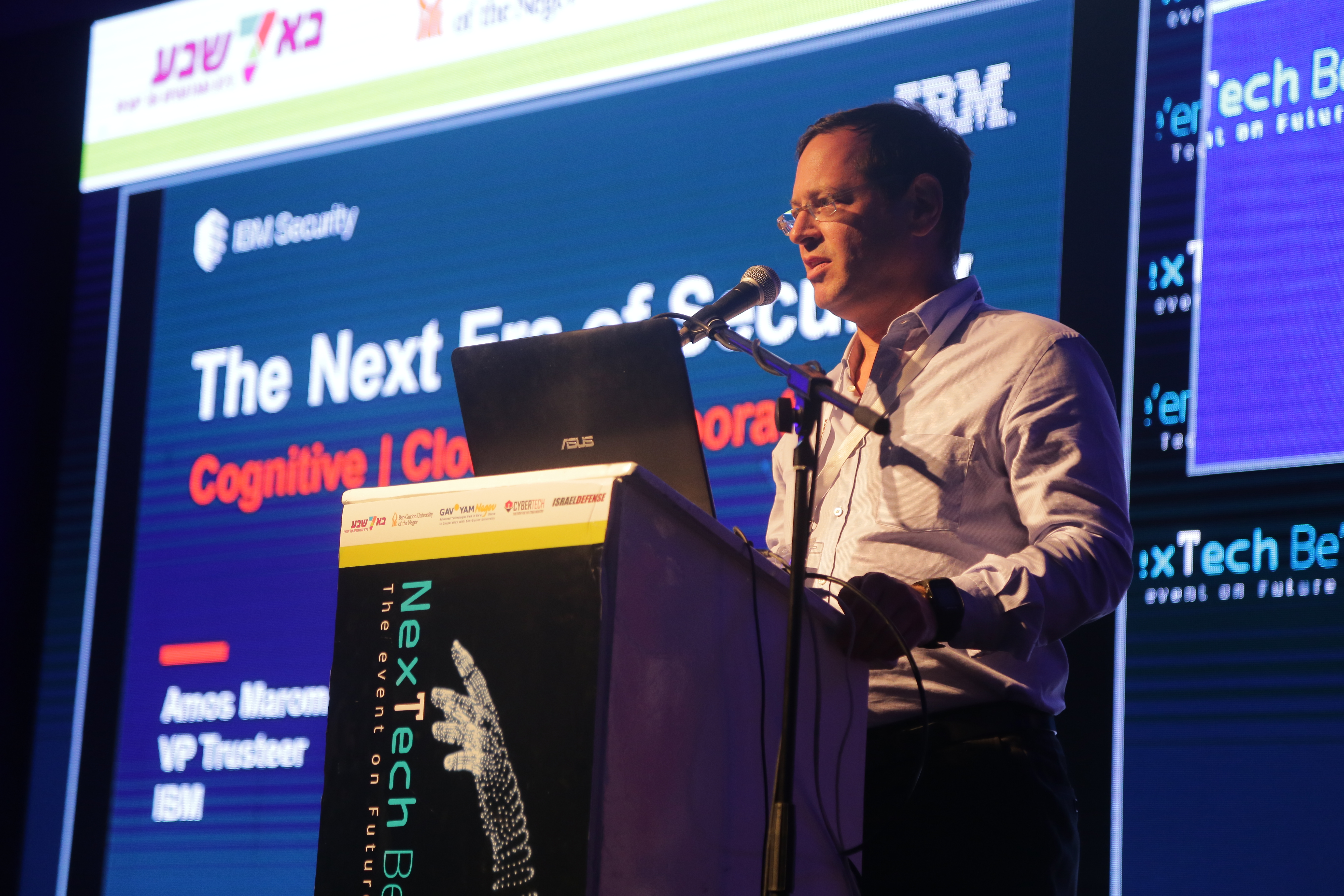
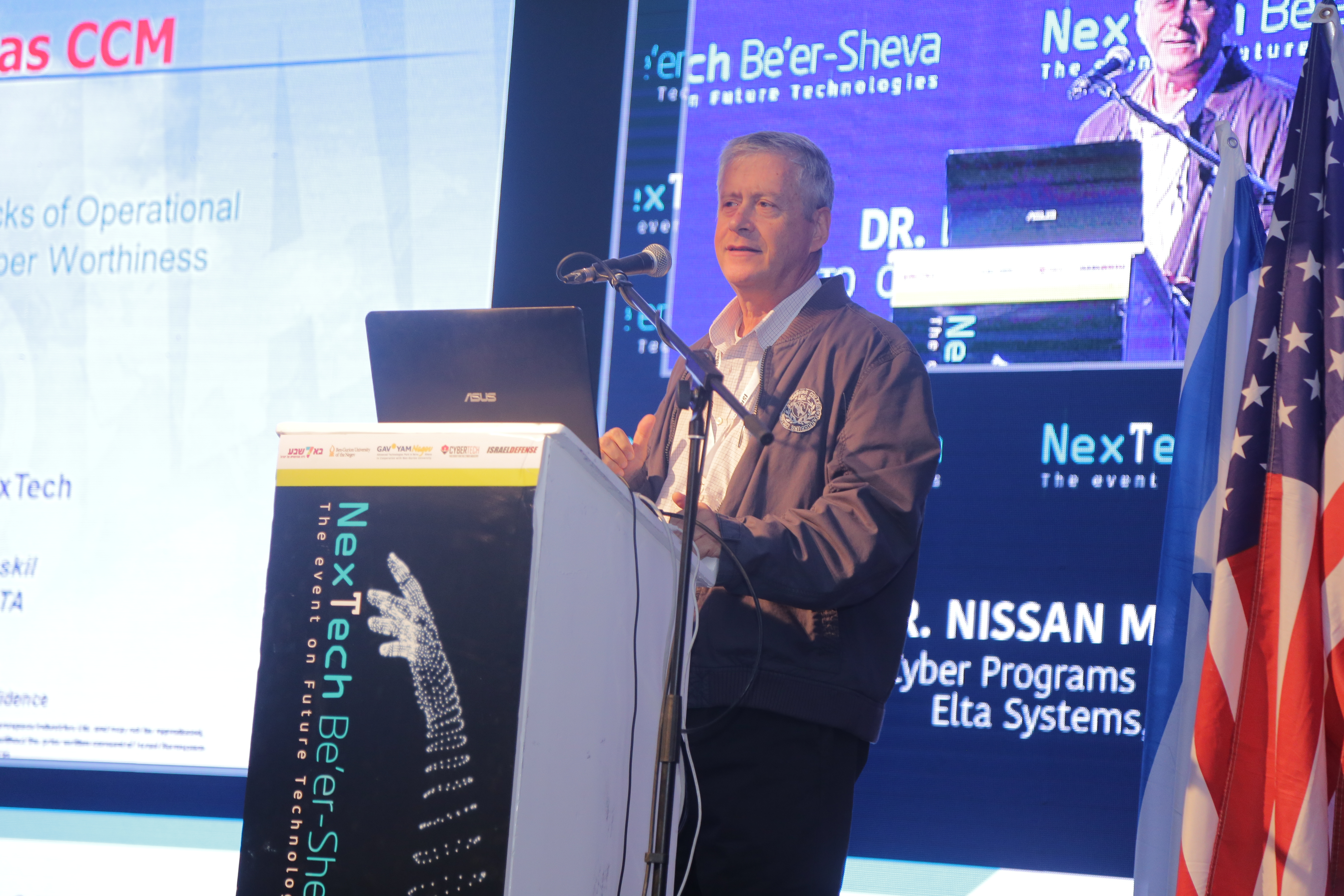
"We Prevented Fraud at the World's Leading Banks"
"Everyone in the media is talking this week about Cyber Monday, but the real news begin in Be'er-Sheva, behind the scenes," said Amos Marom, VP of IBM Trusteer, a provider of security solutions against financial fraud to hundreds of major banks worldwide, in his address at the NexTech conference. "Owing to the technology developed at the Cyber Technology Excellence Center, an exclusive cooperative alliance between IBM and the Ben-Gurion University, we managed to detect and prevent, over the last few weeks, attempts of financial fraud at the world's leading banks."
Rick Kaplan, CEO of IBM Israel, also attended the conference and said: "We should invest in education and decide how to focus our efforts." In the context of IBM's activity in Israel, the Company offers summer camp activities and professional meetings for youngsters, in order to get them interested in studying the sciences. Kaplan explained that the Company is engaged in extensive activity opposite IDF and is a partner in the development of the national CERT – Israel's national cybersecurity organization.

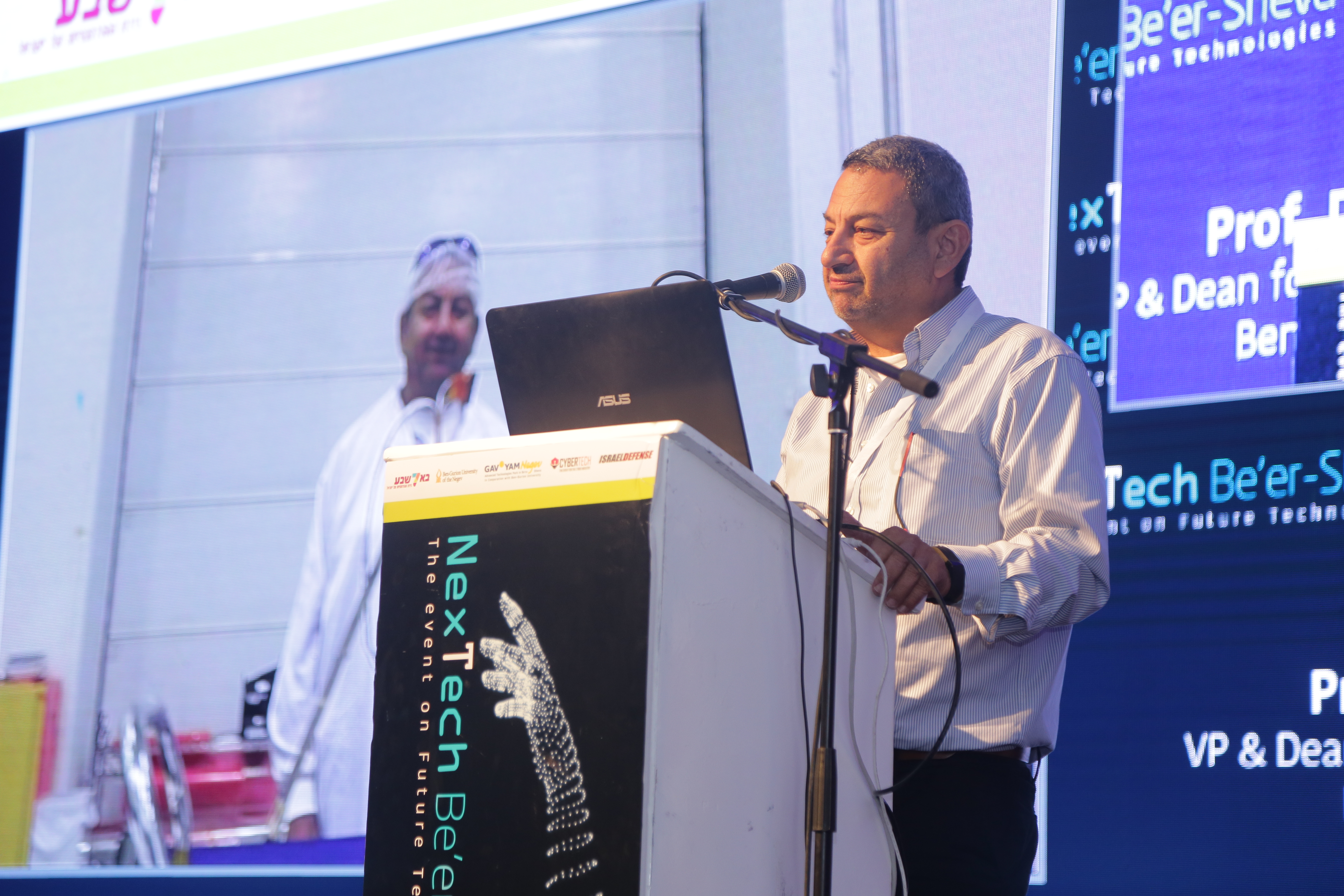
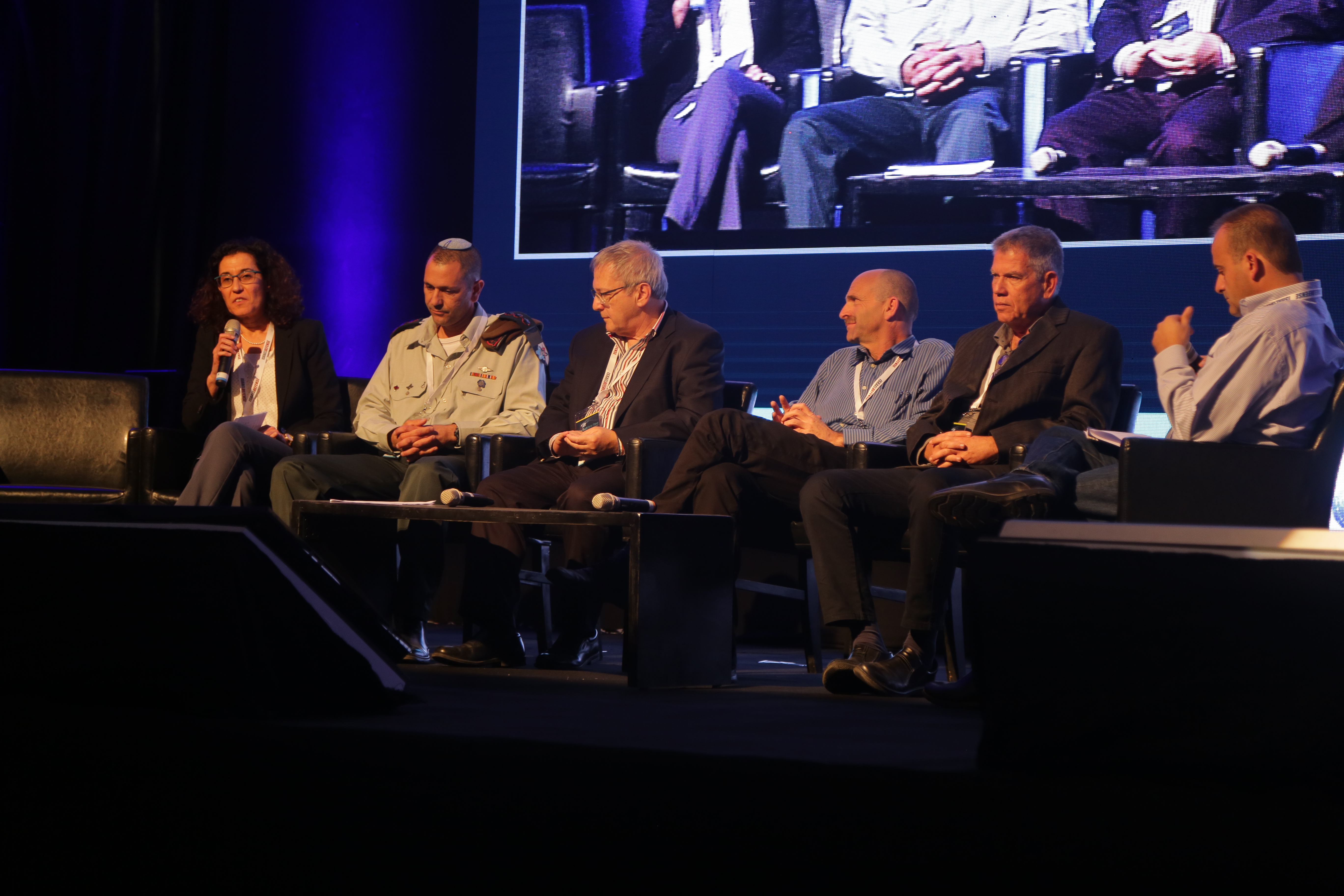
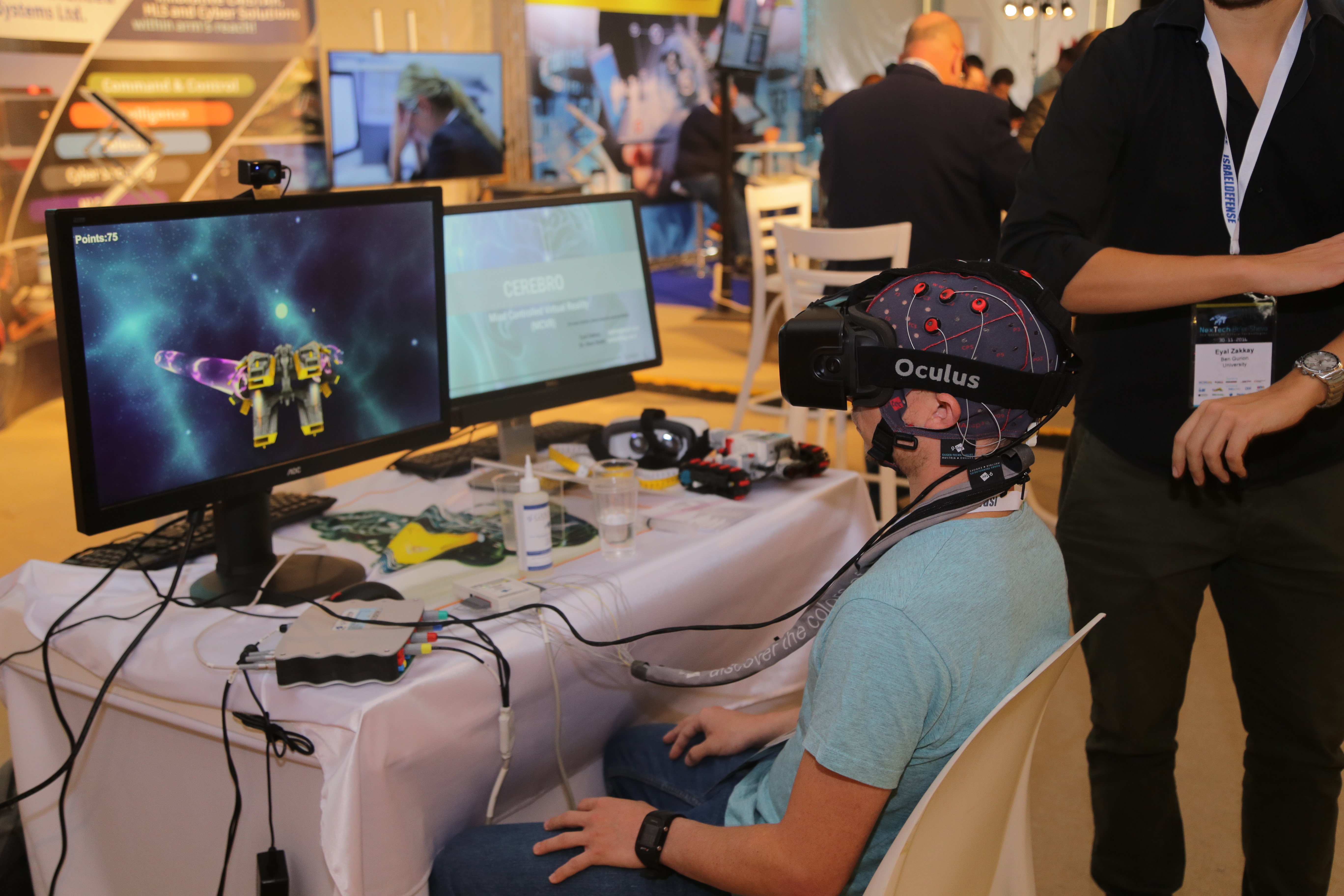
NexTech 2016 Conference has brought together hundreds of senior executives from the industrial and high-tech worlds and representatives from 15 countries
Hundreds of people have participated at the NexTech Be'er-Sheva 2016 – the International Advanced Technology Conference, which was held yesterday (November 30, 2016) at the Gav-Yam Negev Hi-Tech Park in Be'er-Sheva, Israel. NexTech is the first conference of its kind in Israel for individuals and organizations involved in the most advanced technological developments from academia and a variety of innovative industries.
The conference was initiated by the Gav-Yam Negev High-Tech Park, Ben-Gurion University, the city of Be'er-Sheva, Israel Defense, and CyberTech – the international event of the cyber technology industry.
During the conference, the Ben-Gurion University and PayPal announced a new partnership. The Ben-Gurion University and PayPal will engage in joint studies and development projects in the fields of Big Data, machine learning, and cybersecurity. This is the first alliance where the PayPal Company associates with an academic institution in Israel. For further information, click here.
Also, the Ben-Gurion University and ImageSat announced the development of an HD spectral sensing system for space missions. Details regarding the cooperative alliance were reported by the head of the research team on behalf of the Ben-Gurion University, Professor Adrian Stern, and the Vice President & R&D Dean of Ben-Gurion University of the Negev, Professor Dan Blomberg. For more details, click here.

The conference themes included future technologies in the fields of Robotics, Cyber Security, AI, Digital Health, IoT, Connected Cars, Machine Learning and others. It also included a unique panel discussion on the subject of the relocation of the elite IDF technology units adjacent to the Hi-Tech Park, as part of the IDF relocation to the Negev region.
"A Global Cyber Superpower is developing in Be'er-Sheva"
The vision of creating an ecosystem combining science and academia, industries, high-tech, the military, C4I, cyberspace and state-of-the-art technology is materializing in Be'er-Sheva – that was the message of the opening of the NexTech 2016 Conference.
The IDF Chief Communications Officer, Brig. Gen. Nati Cohen, reviewed the connection between the relocation of IDF to the Negev and the most profound change the IDF is currently undergoing – the implementation of a new operational concept of making the information available to IDF accessible all the way down to the battalion commanders and other junior commanders in the field. The IDF is gradually evolving into 'Network IDF,' a military organization that would implement network-centric warfare, namely – operational Internet and the establishment of a central database out of which the information will be delivered to the end user – the commander on the ground. That is the concept which best suits the changes in the modes of war on today's battlefield. That is the outcome of the transition from Big Data centers to making the information accessible all the way down to the tactical echelon.

Dr. Eviatar Matania, Head of the Israeli National Cyber Bureau, announced that cyber technology is evolving into the core of future technologies. Dr. Matania elaborated on the role and function of the state: "The government must be involved by placing at the disposal of science the resources, the infrastructures, but the government must not dictate curricular contents or business plans. The government should not dictate to academia or to industry – its role is to assist but not to interfere."
According to the Head of the National Cyber Bureau, a global cyber superpower is currently developing in Be'er-Sheva. In order to ensure that it continues to prosper and exist, the best scientific manpower must be trained and prepared. Today, cyber affects the economy, academia, society and the military, said Dr. Matania.

Professor Rivka Carmi, President of the Ben-Gurion University, said that the Gav-Yam High-Tech Park is already home to 50 international corporations. "The concept of cooperation between academia and the industries has proven its effectiveness and it works. A production line of talent, vision, strong will, entrepreneurship and innovation is being developed here."
The Mayor of Be'er-Sheva, Ruvik Danilovich, added that "The process taking place here in Be'er-Sheva in the field of cyber technology – the establishment of the National Cyber Bureau – is just as important as the establishment of the State of Israel. Vision, partnership and volunteering, the involvement of the government, the municipality, IDF, the C4I Corps, businesses, and academia – all of these elements share a common interest."
A Rare Public Appearance by the Head of IIBR at NexTech 2016
The Israel Institute for Biological Research (IIBR) is a government research institute charged, among other things, with scientific and medical defense in the fields of biology, chemistry, and other sciences – as Prof. Shmuel Shapira, the Head of IIBR, said in a rare address delivered at the NexTech 2016 Conference.
The Head of the Israel Institute for Biological Research (IIBR) rarely appears in public, so his lecture at the conference generated much interest, despite the fact that he had confessed that he would not be able to speak about everything. Prof. Shapira agreed to say that the scientists of IIBR are engaged in research regarding toxic substances and the methods for treating and curing the injuries involving toxic substances; that they study the effects of exposure to hazardous toxic substances, including mustard gas and nerve gas and the effects thereof on the body of affected individuals.

Yehoshua ('Shuki') Yehuda, CTO at Elbit Systems, spoke about the connection between military and civilian technologies. "A military client is interested primarily in the performance characteristics of the system and to a lesser degree, in its cost," said Yehuda, "While a civilian client is interested, first and foremost, in the price of the product." Today, military technologies may be assimilated into civilian technologies, and such processes are taking place in the fields of computers, communication and other fields. For example, the pilot's helmet Elbit Systems have been developing for many years has found civilian applications in the field of vehicles and transportation and, quite naturally, in civil aviation – in both passenger and transport aircraft. The same applies to the field of robotics. "In the military world they use robots for surveillance and for driving autonomous vehicles, and today this technology has civilian derivatives."
Dr. Nissan Maskil, CTO at ELTA (IAI) devoted his address to the importance of the human element in the development of work processes for coping with cyber defense and security.

"We Prevented Fraud at the World's Leading Banks"
"Everyone in the media is talking this week about Cyber Monday, but the real news begin in Be'er-Sheva, behind the scenes," said Amos Marom, VP of IBM Trusteer, a provider of security solutions against financial fraud to hundreds of major banks worldwide, in his address at the NexTech conference. "Owing to the technology developed at the Cyber Technology Excellence Center, an exclusive cooperative alliance between IBM and the Ben-Gurion University, we managed to detect and prevent, over the last few weeks, attempts of financial fraud at the world's leading banks."
Rick Kaplan, CEO of IBM Israel, also attended the conference and said: "We should invest in education and decide how to focus our efforts." In the context of IBM's activity in Israel, the Company offers summer camp activities and professional meetings for youngsters, in order to get them interested in studying the sciences. Kaplan explained that the Company is engaged in extensive activity opposite IDF and is a partner in the development of the national CERT – Israel's national cybersecurity organization.





